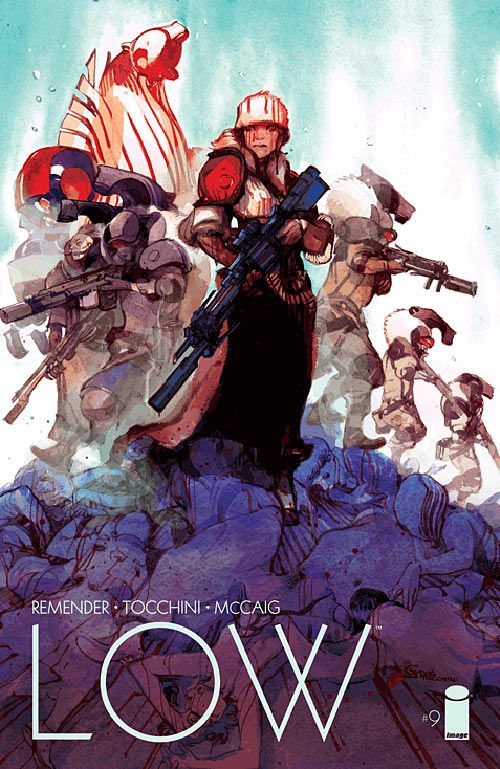"Low" #9 serves up Della's backstory and daring escape from the Ministry of Thought as the consequences of her relationship close in and the Salusians approach the probe. Remender and Tocchini put their chess pieces in place in this issue, and it's mostly a plot-driven affair. Tocchini and Dave McCaig's rich, explosive fight scenes still get the heart pumping but, given that "Low" has landed so many gut-punch issues, issue #9 feels a little mundane. However, that criticism says more about the power of "Low" as a whole than it does about any problems with the story. I still can't wait to see how the results of this issue play out.
Remender uses Della's backstory and current problems to dive deeper into the repressive Voldian society and its hatred for optimism. While Roln displays an all-encompassing, philosophical hatred for hope, Czar Dvonyen's is a more practical fear of its consequences. As part of "Low"s ongoing exploration of the uses for and importance of optimism, this perspective on how repression and social control rely on hopelessness to make citizens feel powerless is fitting. However, it isn't particularly hard science fiction. Remender's societies are by no means meticulously explained, and he's much more interested in their metaphorical workings than any realistic social structures. This doesn't make them any less interesting, but it does affect the nature of that interest. The world building feels more like theme-building.
Tocchini and McCaig's artwork is full of beautiful designs and bewildering physics. The Helm Suit in particular seems capable of anything with a single gesture; its all-powerful, inexplicable functionality doesn't seem to have established triggers or controls. In some ways, this feels a little lazy; in other ways, it makes the suit look even more awesome and imposing, because the reader can't figure out how it's held together. Tocchini also plays with the line between beauty and cruelty, mimicking the elegant lines of the Helm Suit's wings in streams of black blood. Meanwhile, McCaig's colors are gushing and orgiastic, like someone introduced Titian to Photoshop. Explosions seem to ripple and billow like real flames. The waters and sky of the Second City look as icy and cold aesthetically as they're supposed to be physically. I've never seen machinery and enclosed urban sprawl look so luxurious and excessive.
That said, the naked boob window that appears when Della is injured was quite an unwelcome detail. It repeatedly took me out of the scene. "Low" has never been a particularly realistic book when it comes to the human form, from the seemingly eternally young Stel to the barely dressed Tajo, but those choices at least added to the world's clear aesthetic. The boob window here does nothing of the sort, and I wish it had been left out.
Taken all together, "Low" #9 is another striking installment in a series that manages to surprise and affect me in every issue. Though it's not one of my favorite issues so far, it still does a fine job of growing its characters and moving its plot.

